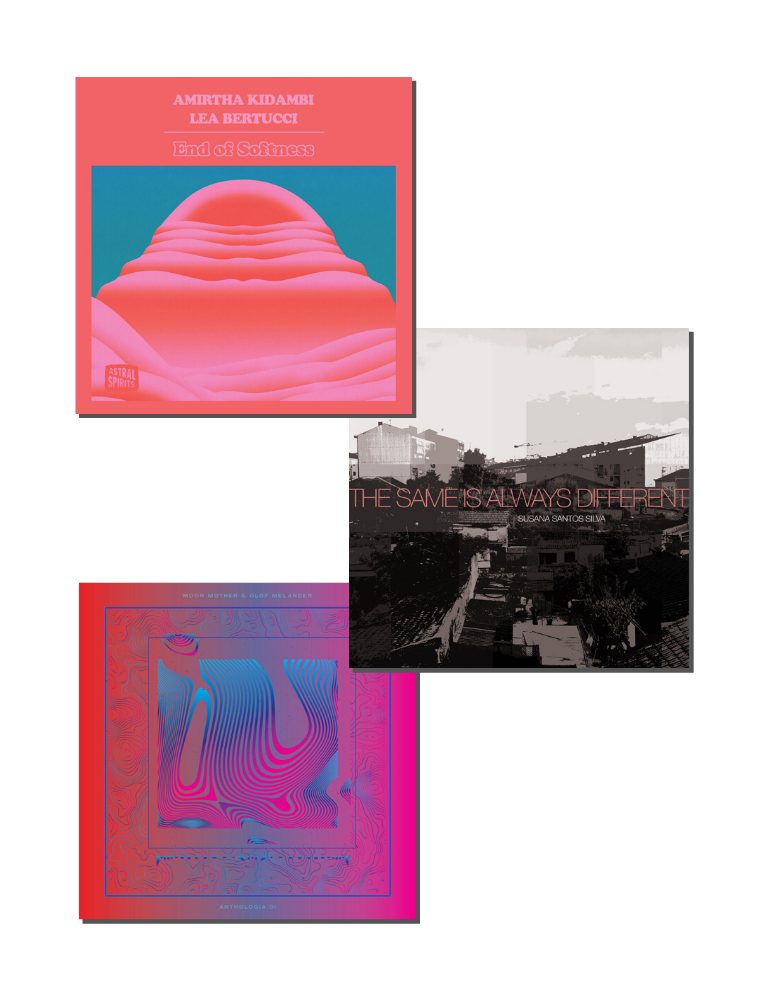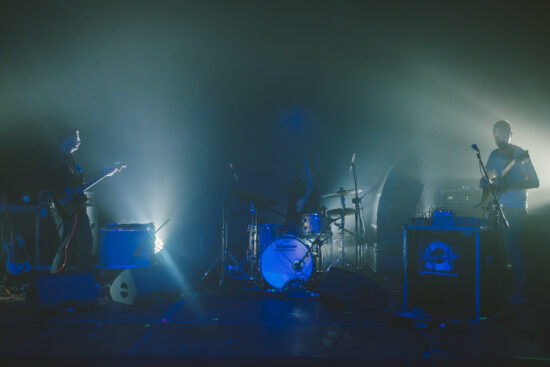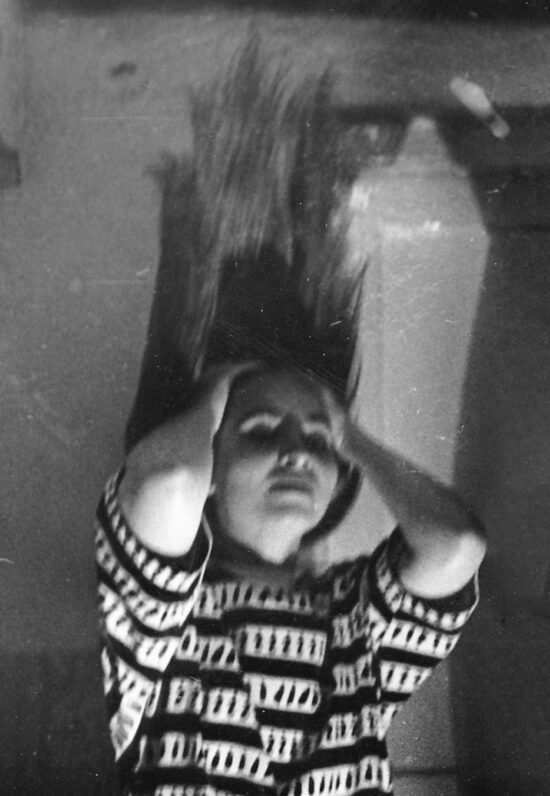Music as a form of catharsis, recycling of ideas or means to bring aid – three albums recorded during the quarantine prove that it served as a creative spark.
Translation: Aleksandra Szkudłapska
The pandemic is a difficult time for many artists, as I’ve recently been told by Lea Bertucci. However, a few weeks in lockdown also yielded a lot of new music, which is only beginning to see the light of day. Based on the following examples, it seems to have come from different places: it’s either a scream from the privacy of one’s home, a distanced look at previous work and showing it in a different light, or the urge to help those in need. In each case, the result is intriguing, opening up new perspectives – whether in the case of Portuguese trumpeter Susana Santos Silva’s latest release or new material prepared by two duos: Lea Bertucci + Amirtha Kidambi and Moor Mother + Olof Melander.
Susan Santos Silva, The Same Is Always Different
The cover of Santos Silva’s The Same Is Always Different shows a view from the room, where she composes. It looks different every day, which you’ll discover once you download the entire album. The same holds true for her instrument: in each subsequent track, her trumpet sounds differently. When after 21 minutes of “The” there is silence, the impact is huge – prior to that, the sound closely filled the space, so the silence is literally palpable, I physically feel how it had swollen in the room. The coarse, distorted trumpet solo played by Silva is raw and terrifying, an explosion of noise. It brings to mind a desperate scream of an artist confined to her home, who intends to use it to break down the walls.
Susana Santos Silva has a lot of records under her belt. However, each solo release seems to offer an important point of reference, a statement of sorts – here provoked by the pandemic, which served as a pretext to demonstrate the versatile and alluring potential of the trumpet. Silva often blows harder, emitting piercing sounds and sending a bitter bugle call into the world from her port apartment. Her work showcases how the limitations of using a single instrument may be put to good use, presenting the amazing timbres of her instrument, and amplifying it using effects and reverbs.In “Same”, the trumpet is more harmonious, but toned down, as if shy, barely bubbling on the surface with the coarse noise in the background. “Is” is a sonorist play with the static, the focus is shifted to details, microsounds, rustles, scratches, sometimes almost sounding like the chirping of birds. “Always”, on the other hand, is a powerful drone resonating in the space, enriched with the reverberating effect, which creates a musical tunnel of sorts. “Different” may seem close to what we’ve heard in the opening of the record, but in fact offers an entirely different sonic texture. Silva spits out the sounds, as if stratifying them, blowing her trumpet lighter, more lyrically. Through experimentation with sound and execution, balancing somewhere between drone music, noise, sonorism and improvisation, Susana creates a poignant, personal story. This is a reflection of everyday life under lockdown – which is inspiring, not repetitive at all, and serves as a catalyst for growth, since The Same Is Always Different is a really important landmark on the musical path of this unique trumpeter.
Amirtha Kidambi and Lea Bertucci published their second record in just six months with the invaluable Astral Spirits label. They have been really active too – a year ago, Kidambi released her second album with the Elder Ones (we had an opportunity to talk at the time), while Lea Bertucci has recently coupled her amazing Resonant Field withAcoustic Shadows. On End of Softness EP, they start with material created when recording Phase Eclipse, showing it in a new light as a result of collage. Last year’s album is based on Kidambi’s vocals, transformed and manipulated by Bertucci using effects or a reel-to-reel tape recorder. The crucial thing, though, is that everything is taking place physically, it’s analogue rather than post-produced. With Live at the Kitchen, we get a glimpse at the amazing sounds generated by Kidambi, who is able to play with her voice, starting with Carnatic improvisations and leading all the way up to screeches and squeals, covering a full range of emotions. Bertucci brilliantly broadens this spectrum, changing the frequency and speed of the voice with her mixing table and tapes, filtering, distorting and multiplying the sounds.
End of Softness is a more intense record than her predecessor – much more dense, often resorting to contrasts. This is exemplified by the process of modulating Kidambi’s vocals, which sometimes end up cut and very removed from the original. At other times, they are poignant and hysterical (“Hysteric Arch”), wailing (“Destroying Angel”), dragging along slowly and heavily, occasionally even venturing into the sphere of lyricism (“Siren Call”). Bertucci uses the vocals as if on a samplodelic basis, a peculiar type of scratching, underlining how amazingly the medium – i.e. tape – influences the sound. “False Profits” even reminds me of the tapes that would always get stuck in my Walkman when I was a teenager – and I mean it as a compliment to Bertucci’s skills. Just like with the looped, modified, screeching, as if choir-like bird chants in the title track, which at one point get drowned out in erotic panting, with Kidambi’s vocals sounding like a dialogue between a man and a woman. End of Softness is an intriguing musical narrative, filled with conflicting juxtapositions, yet evocatively weaved by both experienced artists.
Music-wise, Moor Mother is equally prolific –she released another solo album in the autumn, Analog Fluids of Sonic Black Holes, and a few weeks ago saw the premiere of her second material with Irreversible Entanglements. This time she collaborates with Olof Melander, who has also just released Crumbs – together, they created a peculiar, colourful soundtrack of the mundane everyday, which starts out with Moor Mother’s preferred free-jazz methodology. The Swede adds structure to it, pinning it together in a more rhythmical, closed structure, combining electronic, jazz and ambient influences. The results sounds like a mixtape or a soundtrack with a very alluring flow. It could seem that the voice is in the foreground here, acting as the main building block of the record, but the music itself provides a solid framework: absorbing, coherent and consistent. At times, it takes on the form of meditative, soothing melodies (the brilliant “Hemlock” with Aquiles Navarro on trumpet), at other times, multi-vocal tracks, like the intriguing “Oleander”, where broken percussion is counterpointed by Ashanti Newman’s singing. Pay attention to the amazing guest features, such as Vijay Iver’s piano parts in “Wolfsbane”, Elliot Levin’s flute in “Ol Time Religion”, or the nuance in the beat-based “Nightshade”. Anthologia 01 is an album recorded in the spirit of free and spiritual jazz – Moor Mother follows in the footsteps of Sun Ra, but choosing rap, poetry and rhythmical electronics as her weapon. Add to that the charity purpose of this record – all proceeds go to Futurist Fund – and it’s clear that here, the pandemic has brought about a double, incredibly positive result.




